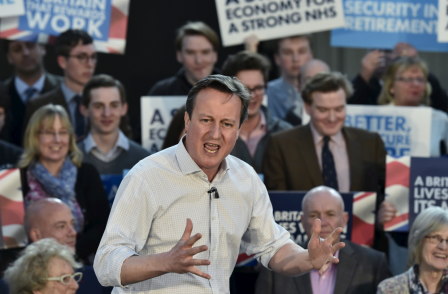
Yougov has published new data which reveals the extent to which readers of strongly pro-Tory newspapers backed the Conservatives in the 2015 general election.
It is based on a survey of 100,000 UK adults conducted between 6 and 18 May and so (given the size of the sample) has to be seen as credible.
Last month I looked at Yougov data from April on newspaper reader voting intentions and concluded that, even at the most generous estimate, the partisan Tory press might have given David Cameron a couple of hundred thousand votes.
So how does this new data change things?
First off, it reflects the apparent late swing to the Tories.
So a Yougov survey of 25,000 UK adults in April found 42 per cent of Sun readers backing the Tories – versus 47 per cent in the post-election data.
Daily Mail readers were 56 per cent Conservative in April, versus 59 per cent in May.
And Daily Telegraph readers were 64 per cent Conservative in April, versus 69 per cent in May.

In my view any analysis of how press bias affected the outcome of the 2015 general election needs to be confined to the Telegraph, Mail, Sun and Mirror (Yougov did not look at the Sunday newspapers).
The Times was (by my reading) more even-handed, whilst leaning to the right. The Guardian and Independent leaned to the left, so can be said to cancel out The Times.
The Daily Star does not cover politics in detail and the Daily Express supported UKIP (which took votes from both Labour and the Conservatives).
There is no doubt that the Mail, Sun and Telegraph were all strongly pro-Conservative in both news and comment. And the Daily Mirror was similarly pro-Labour.
On the face it, the fact the three dominant UK newspaper titles were so strongly pro-Conservative should have had an impact.
According to NRS figures for the year to March 2015 they have a combined daily print readership of around 10m – more people than voted Labour.
Making the huge assumption that readers of those titles would have followed the national trend had they not been brainwashed by their paper of choice into voting Conservative, we can get an idea of the biggest potential impact they might have had.
According to Yougov, 59 per cent of Daily Mail readers voted Conservative, versus 37 per cent of voters overall. The Mail has a daily readership of 3.7m according to NRS. So taking off a third to allow for turnout, it might have delivered around 500,000 votes to the Conservatives (22 per cent of 3.7m multiplied by 0.66).
The Sun has a daily readership of 5.2m, accoding to NRS. Yougov found that 47 per cent of its readers voted Conservative. If we discount Scottish readers (where The Sun backed the SNP) and allow for turnout, The Sun may have delivered around 300,000 votes to the Conservatives.
The Daily Telegraph has 1.1m readers a day (NRS) – meaning it might have delivered around 200,000 votes to the Tories.
So by this analysis, 1m readers of the partisan Tory press may have been delivered to the Conservatives.
The flip side of this is that the Daily Mirror has 2.2m print readers, according to NRS, and 67 per cent of these backed Labour (versus 30.4 per cent of the general public). So, again knocking off a third to allow for turnout, the Mirror might have delivered around 500,000 votes to Labour.
This still leaves a net benefit to the Tories of around 500,000 votes potentially due to press bias.
If you add the Daily Express into the pro-Tory mix – on the grounds that it is firmly on the right and swung behind UKIP fairly late – you get another 100,000 votes for Cameron.
The Conservatives won by 11.3m votes to Labour’s 9.4m. So 500,000 or 600,000 might have made a difference, but Labour can’t blame the press bias solely for their defeat.
And we have to remember that Telegraph and Mail readers do tend to come from the more well-off middle class who are likely to vote Conservative anyway.
It is of course nonsense to suggest that the Daily Mail’s coverage is solely responsible for the fact its readers are so much more pro-Conservative than the general public. Its editor Paul Dacre has been in his job for 22 years because he has the knack of reflecting the views of his readers and picking issues which resonate with them, rather than because he tells them what to think.
The Conservatives only won by 12 seats so perhaps the partisan press did make a difference.
It is certainly an anomaly that 60 per cent of the UK national newspaper market backed the Conservatives, versus 37 of the general public.
Yet my hunch remains that those who blame the pro-Tory press for Labour’s defeat are not crediting newspaper readers with enough intelligence.
Cards on the table: I generally read The Sun and Daily Mail on the train throughout the general election campaign (picking up the other papers in the office) and I know I was able to instantly discount what I viewed as spin and propaganda. I ended up voting Liberal Democrat for a number of reasons, including the candidate. The one piece of journalism which stands out as possibly influencing me is a piece I read in The Times condemning the Conservative policy on the right-to-buy housing association properties.
I suspect most newspaper readers, like me, are capable of making more nuanced decisions about how to vote than some commentators believe and of casting a discerning eye over coverage which appears to be biased.
Email pged@pressgazette.co.uk to point out mistakes, provide story tips or send in a letter for publication on our "Letters Page" blog
